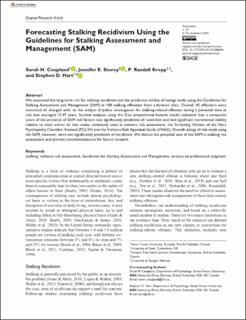Forecasting Stalking Recidivism Using the Guidelines for Stalking Assessment and Management (SAM)
Journal article, Peer reviewed
Published version

Åpne
Permanent lenke
https://hdl.handle.net/11250/3060179Utgivelsesdato
2022Metadata
Vis full innførselSamlinger
Sammendrag
We examined the long-term risk for stalking recidivism and the predictive validity of ratings made using the Guidelines for Stalking Assessment and Management (SAM) in 100 stalking offenders from a forensic clinic. Overall, 45 offenders were convicted of, charged with, or the subject of police investigation for stalking-related offenses during a potential time at risk that averaged 13.47 years. Survival analyses using the Cox proportional hazards model indicated that a composite score of the presence of SAM risk factors was significantly predictive of recidivism and had significant incremental validity relative to total scores on two scales commonly used in violence risk assessment, the Screening Version of the Hare Psychopathy Checklist–Revised (PCL:SV) and the Violence Risk Appraisal Guide (VRAG). Overall ratings of risk made using the SAM, however, were not significantly predictive of recidivism. We discuss the potential uses of the SAM in stalking risk assessment and provide recommendations for future research.
